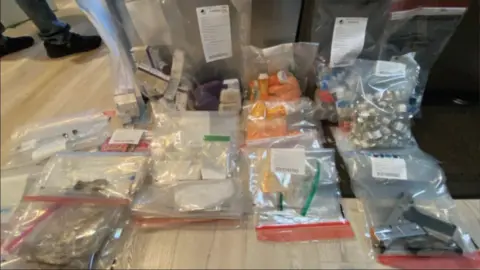'Ketamine Queen' and cover-ups: What we learned from the Matthew Perry investigation
When Friends actor Matthew Perry was found dead in a hot tub at his Los Angeles home last year, it seemed like it could have just been an accident.
He had been treating depression with ketamine - and no foul play was expected.
However, the arrest of five people including medical doctors, Perry's assistant and an alleged dealer US prosecutors have described as the "Ketamine Queen", has shed light on an alleged vast ketamine-dealing underground network, cover-up attempts - and another death, too.
Dr Salvador Plasencia - one of those accused of supplying the actor with ketamine - allegedly called him "a moron" and wondered how much to charge him for the drug - eventually, more than 165 times its price, according to prosecutors.
'The Ketamine Queen' and a 'drug-selling emporium'
 US District Court
US District CourtAlleged dealer Jasveen Sangha's name comes up again and again in the investigation.
Authorities allege the "Ketamine Queen" supplied the drugs that led to Perry's death on 28 October 2023.
The 41-year-old is accused of selling 50 vials of ketamine to him for about $11,000 (£8,550) and is described by prosecutors as a drug trafficker who knew the ketamine she distributed could be deadly.
Her North Hollywood home was a "drug-selling emporium", Martin Estrada, the US attorney for California's Central District, said.
More than 80 vials of ketamine were allegedly found there in a search, along with thousands of pills that included methamphetamine, cocaine and Xanax.
A handgun was also discovered, Mr Estrada said.
The home, called the "Sangha Stash House" in the indictment, was where she is alleged to have packaged and distributed drugs, mostly for the rich and famous.
Ms Sangha "only deal[s] with high end and celebs", according to the indictment.
Mr Estrada alleged she was a "major source of supply for ketamine to others as well as Perry".
Doctors and dealers 'exploited' Perry
As Perry fell deeper into addiction, he wanted more and more ketamine and sought it for lower prices, which led him to street dealers as well as the more elite providers, authorities said.
Those charged in the case took advantage of him, Mr Estrada said.
Dr Plasencia wrote in one text message that he wanted to be Perry's "go-to for drugs".
In another, he wrote: "I wonder how much this moron will pay?".
It is alleged that Perry paid them around $2,000 for vials that actually cost about $12 a piece.
“These defendants cared more about profiting off of Mr Perry than caring for his well-being,” said Mr Estrada.
Authorities say Perry purchased 20 vials of ketamine from Dr Plasencia for a total of $55,000 between September and October 2023.
Dr Plasencia also allegedly taught Kenneth Iwamasa, the actor's live-in assistant, how to inject the drug, even though he had learned "that Perry’s ketamine addiction was spiralling out of control", according to investigators.
Authorities say the doctor provided more ketamine even though he witnessed Perry "freeze up" while administering the drug on one occasion.
Alleged cover-up attempts - and discovery of second death
Following Perry's death, those accused of supplying him with the drugs attempted to hide their actions, investigators say.
Authorities say Ms Sangha sent a message to another suspect telling him to "delete all our messages".
Eric Fleming, who pleaded guilty to conspiring to distribute drugs unlawfully, is alleged to have messaged Ms Sangha: “Please call... Got more info and want to bounce ideas off you. I’m 90% sure everyone is protected. I never dealt with [Perry] only his assistant. So the assistant was the enabler."
He also asked Ms Sangha, according to court documents, whether ketamine stays "in your system or is it immediately flushed out".
Authorities say they used coded language, calling ketamine "Dr Pepper", "bots" or "cans".
Dr Plasencia allegedly falsified medical records in an attempt to make the drugs given to the actor look legitimate.
Authorities also uncovered that Ms Sangha was allegedly tied to another overdose death in 2019.
According to court documents, she knew about the dangers of ketamine after selling it to a customer named Cody McLaury, who died of an overdose after buying the drug.
One of his family members is said to have texted her saying: "The ketamine you sold my brother killed him. It's listed as the cause of death."
Days later, investigators say, Ms Sangha searched on Google: "Can ketamine be listed as a cause of death?"
Authorities say Ms Sangha will face charges in that case.
Assistant injected actor multiple times daily
Iwamasa, Perry's live-in assistant, was the person who found the actor dead.
Investigators say he was also the one who injected Perry with the ketamine that led to his death.
Iwamasa never received medical training and "knew little, if anything" about administering controlled substances, according to court documents.
In the four days leading up to and including Perry's death, prosecutors say Iwamasa administered more than 20 shots of ketamine, three on the day the actor died.
He was charged in July with one count of conspiracy to distribute ketamine resulting in death and serious bodily injury. Prosecutors say he has since pleaded guilty to the charge.
Ketamine is supposed to be administered only by a physician, investigators say, and patients who have taken the drug should be monitored by a professional because of its possible harmful effects.
On 10 October, weeks before Perry's death, Dr Plasencia is alleged to have bought 10 vials of ketamine from accused co-conspirator Dr Mark Chavez, which he intended to sell to Perry.
Authorities say Dr Plasencia then met Perry and Iwamasa in a public parking lot, where the doctor injected the actor while inside a vehicle.
Two days later, he allegedly injected him at home with a large dose that caused him to "freeze up" and his blood pressure to spike.
Dr Plasencia told Iwamasa something to the effect of, “Let’s not do that again.”
But he allegedly left additional vials with Iwamasa.
Perry's legacy with a hope of helping others
 Reuters
ReutersPerry was open about his addictions. His 2022 memoir described decades struggling with alcohol and drugs. He wrote about his co-star Jennifer Anniston confronting him over smelling alcohol on his breath and the millions he'd spent trying to remain sober.
He said that he hoped his openness would help others who were struggling. The homepage for the Matthew Perry Foundation, set up after his death, has his quote: "When I die, I want helping others to be the first thing that's mentioned."
The head of the federal Drug Enforcement Agency, Anne Milgram, said on Thursday that the arrests and the public details of the high-profile case were likely to help others and prevent deaths - exactly as Perry had wanted.
